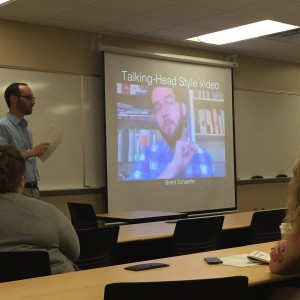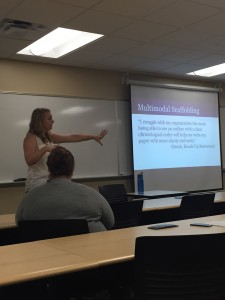Panelists
Jason Dockter, Lincoln Land Community College
Jacki Fiscus, Univerity of Washington
Review
While I always enjoy learning about new approaches to teaching multimodality, what made Jason Dockter and Jacki Fiscus’ multimodality panel particularly interesting and useful to me was their perfect combination of theory and practice. Both presenters introduced and discussed their theoretical approaches to multimodality, before sharing specific examples and activities that they developed to enact these theories in their classrooms and writing programs.
First, Jason Dockter, drawing on 15 years of experience as an online writing instructor, began his presentation with seemingly simple yet often un-asked questions:
Why did I begin teaching online by attempting to recreate what I did in a face to face class?
Why did I use the same methods and pedagogies to teach online and face-to-face?
Dockter continued by pointing to the syllabus–a genre typically used (often unaltered) in face-to-face and online teaching environments. Dockter argued that using a text-based syllabus for online courses may not be the best method of delivering course information:
“The syllabus is typically designed to be used in a specific way for specific face-to-face interactions.”
These interactions, Dockter argues, are completely different in online courses. Therefore, in order to effectively deliver course outcomes and expectations to students in online courses, we should consider making use of alternate modes and modalities to transform the syllabus genre.
Dockter then explained that he has recently been creating video syllabi to introduce his online courses to students.

The video syllabus, Dockter continued, serves as an introduction to both a course *and* an instructor. Creating a video syllabus, in turn, allows instructors to recreate and transform the face-to-face course introduction that students would receive in a traditional classroom.
As Dockter continued introducing his video syllabus, he urged instructors trying the video syllabus genre for the first time to “keep it casual–use minimal editing and try to keep the video as relaxed as possible.” In this way, Dockter argues, the “informalities of video syllabi [may]enhance the informality of the teacher-student relationship. Through mistakes [in the video]students may get clues to the humanity of their online teacher.”
As Dockter concluded his presentation by emphasizing that “online teaching materials function in ways that face-to-face teaching materials cannot,” I became increasingly excited to begin teaching my first fully online course this summer. Thanks, Jason, for the helpful tips and suggestions.
Following Dockter’s discussion, Jacki Fiscus began her presentation by drawing connections between multimodality and rhetorical genre studies. Fiscus assigns multimodal projects in her writing courses to help students gain what Amy Devitt defines as “critical genre awareness”–the ability to understand (and make use of) the ideological effects of genres. While Fiscus assigns “traditional” written papers in her courses, she has found value in assigning multimodal projects to scaffold “traditional” writing.

Fiscus continued her presentation by sharing a multimodal annotated bibliography assignment which asks students to summarize various sources and to “begin to see the connections between the sources.” Rather than having students write a traditional bibliography, Fiscus asks her students to use a “combination of modes” to complete the tasks of the project. She then asks students to write a “Heads Up Statement” in which students to discuss the rhetorical choices they made in their multimodal annotated bibliographies.
It was incredible to see how Fiscus’ students interpreted and applied multimodal genres in their annotated bibliographies. One student, Kate, drew on her background as a dancer to create an annotated bibliography rap, which Fiscus kindly played for us at the end of her presentation. To see more examples of the multimodal annotated bibliographies students created in this course, please see Fiscus’ earlier contribution to our DRC blog carnival.
Ultimately, Fiscus’ students created multimodal annotated bibliographies in preparation to uptake other “traditional” written genres in their writing course. Through her students’ success with this project, Fiscus explained:
“It is clear that multimodal projects create a space for students to become metacognitive about their learning styles and transfer their knowledge to new situations”
I’m thankful to have learned so much from Jacki and Jason’s presentations. I left this session with a ton of new ideas for how to leverage multimodality as a way to help my students receive, process, make, and share knowledge in (and across) their courses.
